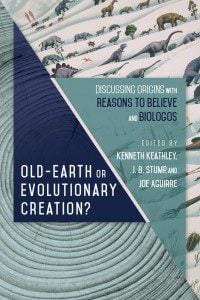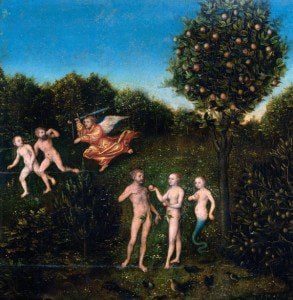 The next chapter in the recent book Old-Earth or Evolutionary Creation? Discussing Origins with Reasons to Believe and BioLogos addresses the question of so-called natural evil, the presence of death and suffering, or natural disasters and predation before the Fall. While the views of these two groups differ on many issues involving creation and evolution on this question both Hugh Ross and Jim Stump are in substantial agreement (James Dew is the SBC moderator for the chapter – an easy task in this case). The bottom line is that so-called “natural evil” isn’t really evil. It is, for some reason that we will never completely understand this side of eternity, a necessary element of God’s good creation. As King James English translates Paul: For now we see through a glass, darkly; but then face to face: now I know in part; but then shall I know even as also I am known. The humility of Job’s final response to God must reflect our position to an extent as well “Surely I spoke of things I did not understand, things too wonderful for me to know”. This doesn’t mean we cannot profitably explore the issues however.
The next chapter in the recent book Old-Earth or Evolutionary Creation? Discussing Origins with Reasons to Believe and BioLogos addresses the question of so-called natural evil, the presence of death and suffering, or natural disasters and predation before the Fall. While the views of these two groups differ on many issues involving creation and evolution on this question both Hugh Ross and Jim Stump are in substantial agreement (James Dew is the SBC moderator for the chapter – an easy task in this case). The bottom line is that so-called “natural evil” isn’t really evil. It is, for some reason that we will never completely understand this side of eternity, a necessary element of God’s good creation. As King James English translates Paul: For now we see through a glass, darkly; but then face to face: now I know in part; but then shall I know even as also I am known. The humility of Job’s final response to God must reflect our position to an extent as well “Surely I spoke of things I did not understand, things too wonderful for me to know”. This doesn’t mean we cannot profitably explore the issues however.
Jim Stump suggests “that God delights in the process of transformation itself.” Rather than a finished world his good creation involves process. This alone isn’t enough, however. To this idea he adds moral maturity as an end product of God’s process of creating.
I’d suggest that moral maturity is a quality that can be developed only by making moral decisions. God can no more create morally mature creatures than he could create free persons incapable of sin. So to achieve moral maturity, agents must be involved in their own moral formation by making decisions with moral implications. But in order to have genuine moral decisions, there must be a challenging environment in which beings are subjected to the kinds of natural evil that force difficult decisions. When faced with such situations, will creatures opt for their own selfish preservation over doing what is right and good? (p. 72)
Later in the chapter, on redirect, Jim expands on this idea a little. God has a perfect purpose that will only be fulled in the age to come. In order for this perfect purpose to be realized creatures (humans) must be brought into moral maturity. This is a growth process for anyone who is not God. Like squaring a circle is not possible – is rather a logical contradiction – it is not possible to create a free and morally mature creature without a process of maturation.
In my section of this chapter I wondered whether perhaps the evolutionary struggle is the only way to develop sentient, moral beings like us. Perhaps it is logically impossible, like creating a square circle (not just really hard, or possible but not actual), to create morally mature people in an instant. The thought behind this is that moral maturity necessarily entails the involvement of the agent who is becoming morally mature. It is not like being rich, which I can attain either through my own efforts or by someone giving me a lot of money. No one – not even God, on this account – can give me moral maturity. (p. 81)
 Hugh Ross makes a similar point although he doesn’t tie it to evolution. He holds that we are in the seventh day of creation leading ultimately to the eighth day – New Creation. The world we have is the best one to shape humans into the creatures God will bring into the new creation.
Hugh Ross makes a similar point although he doesn’t tie it to evolution. He holds that we are in the seventh day of creation leading ultimately to the eighth day – New Creation. The world we have is the best one to shape humans into the creatures God will bring into the new creation.
Some may respond, “Why didn’t God place Adam and Eve in the new creation to start with?” It can be inferred from Scripture that unless humans are first tested by the greatest possible temptation – the most compelling attraction of evil – the careers, rewards, and relationships of the new creation cannot be both perfect and permanently secure. Either human free will and the capacity for love would be greatly diminished rather than enhanced, or the return of rebellion against God’s authority and the consequent evil would remain an ever-present danger. (p. 75)
Later, on redirect, Hugh emphasizes the redemptive focus of creation. “The laws of physics, the cosmic space-time dimensions, and the physical characteristics of the universe are designed to facilitate the redemption of humans.” He elaborates:
While so-called natural evil is not the direct result of the fall, in creating the universe God foreknew that moral evil would enter his good creation. Consequently, he designed his creation in advance with the features to optimally deal with moral evil once it arose. The creation design had, as a necessary byproduct, the occasional occurrence of natural disasters and disease. … To summarize, in the context of God’s strategy to completely and permanently eliminate evil and suffering from his creation while enhancing the free-will capacity of redeemed humans, everything that God created is very good. (p. 83-84)
Although Hugh believes that death and moral evil entered human experience through the sin of Adam and Eve, this was not the entry of moral evil into creation. Adam and Eve were tempted into rebellion by the serpent already in creation. The snake was in the garden before Adam and Eve fell.
Ultimately we look to the hope of the new creation and rest in the assured knowledge that God knows what he is doing and knew what he was doing from the beginning of creation.
What do you think of the positions of Hugh Ross and Jim Stump?
Is natural evil a problem for Christian theology?
If you wish to contact me directly, you may do so at rjs4mail[at]att.net
If interested you can subscribe to a full text feed of my posts at Musings on Science and Theology.















